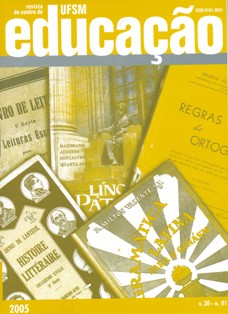<b> A dança de rua e o rap no cotidiano de adolescentes privados de liberdade </b>
Palabras clave:
Adolescent, Social representation, Street dance.Resumen
Esse estudo refere-se às representações sociais da dança de rua para os adolescentes privados de liberdade, internos no CASE de Santa Maria/RS, situação em que se buscou analisar as relações dos adolescentes que participavam das aulas de dança com o contexto, detalhando as representações sociais dos movimentos que compõem a dança de rua e as letras dos raps. Esta pesquisa fundamenta-se numa abordagem etnográfica e investigou 16 adolescentes do sexo masculino, internos. Para esse estudo utilizou-se a observação participante e conversas informais relatas minuciosamente em diário de campo, complementadas por entrevistas gravadas em fita K7 e transcritas posteriormente. Ao analisar os aspectos estudados, observou-se a preferência e a admiração dos adolescentes pelo estilo break, principalmente nos movimentos acrobáticos de chão e aéreos, por terem uma conotação de desafio em suas vidas. Notou-se que as letras dos raps traziam consigo uma representação ambígua, pois se revelaram tanto uma forma de alerta, como uma conduta a ser seguida, verificando-se, dessa forma, que os movimentos da dança de rua e as letras dos raps representaram, para os adolescentes internos na instituição, uma possibilidade de desabafo de suas angústias e conflitos. Assim, as representações sociais construídas em torno da dança de rua localizam e identificam culturalmente os adolescentes privados de liberdade.
Palavras-chave: Adolescentes. Representações Sociais. Dança de rua.
Descargas
Publicado
Cómo citar
Número
Sección
Licencia

This work is licensed under a Creative Commons Attribution-NonCommercial 4.0 International (CC BY-NC 4.0)
Declaramos o artigo _______________________________ a ser submetido para avaliação o periódico Educação (UFSM) é original e inédito, assim como não foi enviado para qualquer outra publicação, como um todo ou uma fração.
Também reconhecemos que a submissão dos originais à Revista Educação (UFSM) implica na transferência de direitos autorais para publicação digital na revista. Em caso de incumprimento, o infrator receberá sanções e penalidades previstas pela Lei Brasileira de Proteção de Direitos Autorais (n. 9610, de 19/02/98).
_______________________________________________________
Nome completo do primeiro autor
CPF ________________






